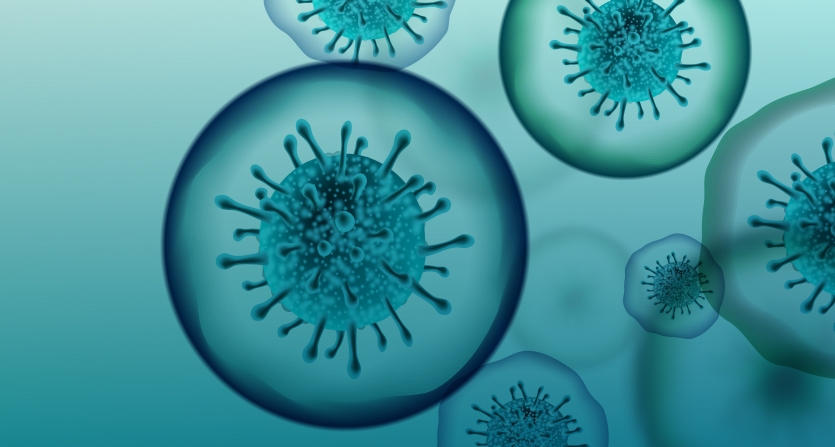Coping With COVID-19: Healthy Living Information to Support You Through the Global Coronavirus Pandemic

COVID-19 (the disease caused by the novel 2019 coronavirus) has changed the world. The health and safety of our readers and everyone around the world is at the forefront of our minds. And we know right now—maybe more than ever—health and wellness occupies a place of prominence in yours.
At Ask The Scientists, we will continue to provide you with the accurate, science-based information about nutrition and living a healthy lifestyle you need right now. We believe information and understanding is power—to maintain your health, to keep your family healthy, to battle fear with truth.
That’s why below you’ll find collected stories about topics of utmost importance—immunity, mental health, self-care, and healthy habits at home. We aren’t experts on the novel coronavirus, so there are no specifics about symptoms or the virus’ spread. But you’ll also find a guide to sourcing trustworthy, scientific information about COVID-19 and the ever-evolving global pandemic.
And if you need an answer to a question about health, wellness, nutrition, or healthy living, we’re here, in this with you. We’ll be doing what we always do—arming you with quality, science-based information to help you continue living your life in these uncertain times.
If you don’t find an answer or the information you’re looking for, all you have to do is ask. Reach out through the site or on our Facebook page.
Understand More About Your Immune Health
- The Immune System: How Your Body Defends Itself
- Build Your Immunity with Simple Immune Boosting Habits
- Immunity Supporting Foods: A Shopper’s Guide to Immunity Nutrition
- Secrets of the Immune System: The Unsung Heroes of Immune System Anatomy
- 7 Hidden Sources of Germs Exposed
- What is the Lymphatic System?
- Pollen Preparedness: Dealing with Seasonal Allergies
Practicing Self-Care and Attending to Your Mental Health
- Hygge Your Way to Calm Comfort: How to Find Daily Moments of Sanctuary
- Stress Management Slideshow: 8 Ways to Decompress
- How to Practice Gratitude and Improve Your Health
- Mindful Living is Healthy Living
- The 8 Pillars of Holistic Health and Wellness
- 10 Reasons Why Being Outside is Important
- Master Your Mood: The Science Behind the Types of Mood
- Search for the Real Chill Pill: Nutrients and Mood
- The Whole Chihuahua: Owning Pets Can Improve Overall Health
- Maintain Your Social Health for a Long, Happy Life (Please remember to practice safe physical distancing to help control the spread of the virus.)
Thriving at Home
- How to Avoid the Gym and Still Get in Shape
- 19 Healthy Family Habits to Try
- Kids in the Kitchen: Tips for Cooking as a Family
- The Science of Healthy Habits—Your Path to Success
- Growing Health in the Garden
- Healthy Home, Healthy Family: What’s Your Home’s Wellness Score?
- Minimizing Distractions to Maximize Quality Family Time
- Oral Health: Why a Winning Smile Helps with a Healthier You
- How Technology (and Light) Affect Sleep
- In Need of Decluttering Your Life? Here’s Some Help
Your Guide to Quality Sources of Coronavirus-Specific Information
What you didn’t find in the links above was specific information about COVID-19. We aren’t experts in epidemiology, virology, or infectious disease. But we can point you to quality sources about symptoms, how the virus spreads, case numbers, and more. And remember that the information you put in your brain is as important right now as the food you put in your body.
Here are tips for finding trustworthy sources of coronavirus information and links to those sites:
- The World Health Organization is the first place to look for global COVID-19 information.
- National government health departments (like the Centers for Disease Control and National Institutes of Health in the U.S.) will have more specific information about what’s happening in your country.
- Local government health department sites have resources that will be most applicable to the situation unfolding around you.
- For the latest research, turn to reputable scientific journals, like Nature Reviews Immunology, New England Journal of Medicine, The Lancet, and the Journal of the American Medical Association.
- Seek out more general coronavirus information from recognized experts. This includes places like the Mayo Clinic, Johns Hopkins, Cleveland Clinic, and academic sites from credible universities around the world.
- Also turn to the Examine.com and Worldometers coronavirus pages for solid statistics and information.
- Entertain and inform yourself by turning to blogs from brands and authors you can trust. Maybe check out What’s Up USANA? for more lifestyle tips about working from home and much more.
What you don’t want to do is constantly scroll through your social media feeds, plucking out the most sensational tidbits being posted. Evaluate the sources of any information popping up on your Facebook or Twitter feeds. Or slim down your information diet to only include trusted sources like the ones listed above. Managing your mental health might even mean taking a break from the deluge of news about the global pandemic.
When you’re ready for more information, we’ll help you find the best source. And if you’re curious about your immune system, eating to help support your immune health, or healthy habits at home, we’ll be here for you. Come back to Ask the Scientists for more immunity, overall wellness, nutrition, and healthy living content you can trust and act on to help you maintain your health.
Article source: https://askthescientists.com/covid-19/?id=13550953&source=copiedlink
Comments
Post a Comment